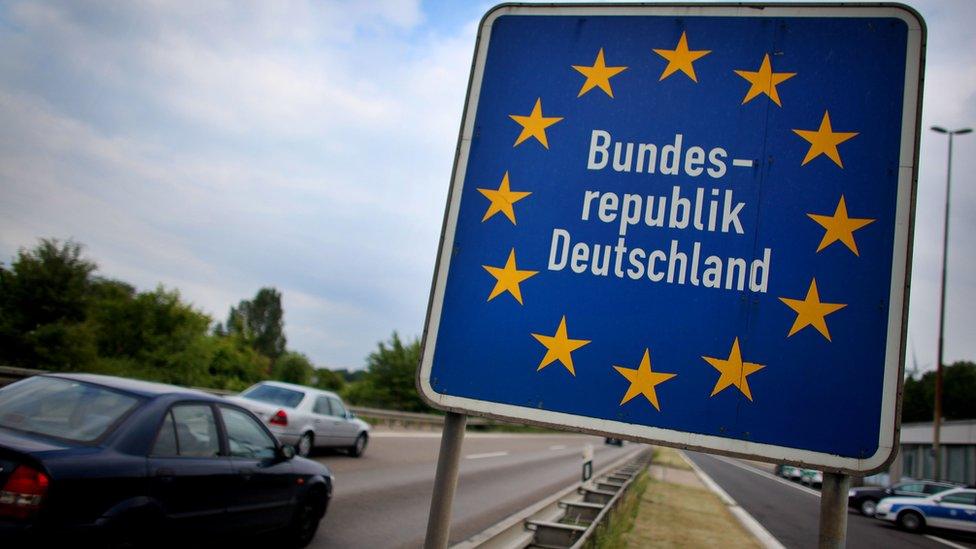France and Italy push for reform of Schengen treaty
- Published
Nicolas Sarkozy: "Schengen should be reformed"
The leaders of France and Italy have said Europe's Schengen open-border treaty should be revised.
The move by President Nicolas Sarkozy and PM Silvio Berlusconi comes after they met to discuss the recent rise in North African migration to Europe.
Italy has angered France by granting visas to thousands of migrants, allowing them to travel across Europe's border-free Schengen zone.
About 25,000 migrants have arrived in southern Italy so far during 2011.
Many have fled unrest in North Africa, and among them are thousands of Tunisians hoping to join relatives in France.
Both Mr Berlusconi and Mr Sarkozy are facing domestic pressure from right-wing parties to curb large-scale immigration.
The Schengen treaty allows legal residents of most EU countries, plus Switzerland, Norway and Iceland to travel across the zone with only minimal border checks.
'Exceptional difficulties'
The two leaders have jointly written to senior EU officials asking that the treaty be investigated.
"The situation concerning migration in the Mediterranean could rapidly transform into a crisis that would undermine the trust that our compatriots have in the [principle] of freedom of travel within Schengen," the letter says, according to excerpts published by German news agency DPA.
It is necessary to "examine the possibility to temporarily re-establish controls within [Schengen] borders in the case of exceptional difficulties," the letter continues.
Speaking at a news conference in Rome after their meeting, Mr Berlusconi said neither Italy nor France wanted the treaty to end.
"But in exceptional circumstances, we both believe that there should be variations to the Schengen treaty, and we've decided to work on that together," he said.
In addition, he said there should be a "principle of solidarity" among European countries, and that southern states along the Mediterranean should not be left on their own to deal with the problems posed by mass immigration.
France and Italy would also ask the Tunisian government to collaborate with them in dissuading migrants from coming to Europe, Mr Berlusconi said.
Mr Sarkozy said the Schengen agreement had to be reformed if it was to survive.
The BBC's Matthew Price joins migrants travelling from Ventimiglia in Italy to France
"We have the euro, we have reformed the European economy - we would like to see the same thing done to Schengen," he said.
The BBC's Duncan Kennedy in Rome says it is a sign of the depth of the tensions created by the migration crisis that they two countries are seeking a revision of the treaty.
Neither country wants to accommodate the North Africa migrants and both want to ensure the situation is not repeated in the future, says our correspondent, so they are calling on Brussels to resolve the problem.
But, he adds, the treaty took years to negotiate so revising it will not be a simple process.
Patrols
Migrants heading to Europe from North Africa often arrive at the Italian island of Lampedusa, which lies about 120km (75 miles) off the Tunisian coast.
The upheavals across the Arab world have triggered a huge wave of migration, and Italy has complained it is being left to cope with the influx alone.
Earlier this month Italy and France agreed to joint sea and air patrols to try to stop African migrants reaching Europe.
France promised to honour the temporary visas Italy has granted the migrants but has said it will turn away those who cannot support themselves financially.
Last week, French police temporarily blocked an Italian train carrying Tunisian migrants from entering France.
Aid agencies have said Europe needs to keep a sense of perspective on the migrants because only a small fraction of those leaving their homes were travelling to Europe.
The International Organization for Migration said many more migrants remained in North African countries than in Europe, and it was African nations that were bearing the biggest burden of caring for them.
Mr Sarkozy also used Tuesday's meeting to praise Italy's earlier announcement that it was sending aircraft to Libya to take part in Nato air strikes.
He said that given Rome's close historical ties to Libya, "who could possibly believe that Italy would not take part in the work of the coalition to allow Libyans to live in freedom after 41 years of dictatorship?"
The two leaders also called for an end to the violent repression of anti-government protests in Syria.
- Published24 April 2016

- Published26 April 2011